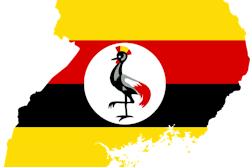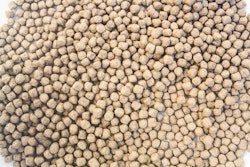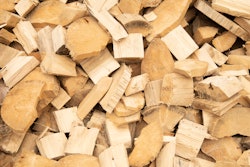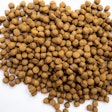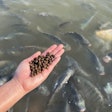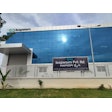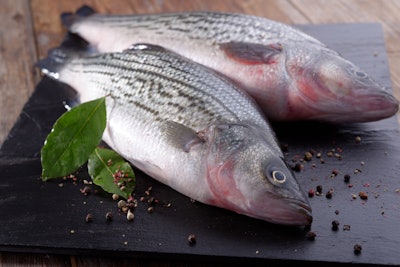
Dr. Rebecca Lochmann, professor of aquaculture and fisheries for the University of Arkansas at Pine Bluff (UAPB), is conducting research to enhance the production sustainability of sunshine bass.
The project is funded through the U.S. Department of Agriculture (USDA) Agricultural Research Service’s (ARS) 1890 Faculty Research Sabbatical Program, which provides faculty at 1890 land-grant universities the opportunity to participate in a residency at an ARS laboratory and conduct cooperative research of mutual interest with ARS scientists.
Lochmann has been working alongside Dr. Carl Webster, an ARS fish nutritionist and co-writer of the research proposal, to investigate ways to enhance the sustainable production of hybrid striped bass through the use of novel plant and insect feed ingredients. The study’s main objective is to evaluate the growth performance, body composition, gut histology and gene expression of sunshine bass that are fed diets with insect meals and oils. They conducted their research for the project at the H.K. Dupree Stuttgart National Aquaculture Research Center.
“Through carefully designed and conducted feeding trials with hybrid striped bass, the overall objective of the project is to reduce – or eliminate – the use of marine fish meal in prepared diets for this species,” Webster said. “This will contribute to the sustainable growth of the aquaculture industry, while optimizing profit potential for domestic producers.”
Hybrid striped bass are grown as food fish throughout the U.S., with more than 98% of production occurring in mid-Atlantic, southern and western states. Food fish production increased 62% from 2013 to 2017 and another 16% in 2018 to an estimated US$56 million.
Lochmann said the continued growth of the domestic hybrid striped bass industry requires gains in efficiency that decrease production costs and improve profitability. The industry faces several emerging issues, however. One of the most critical challenges is the need for nutritious yet environmentally sustainable diets that can be fed in intensified food fish production systems.
“Marine fish meal is the most desired ingredient in aquaculture diets due to its palatability, high protein and amino acid content and quality, and essential fatty acids,” she said. “However, it is also the most expensive macro-ingredient in an aquaculture diet. Thus, reliance on marine fish meal in diets for fish and crustaceans is problematic since wild marine fish stocks are static – or could decline – due to overfishing, pollution and climate change. This has forced the search for alternative protein sources.”
A promising alternative to the use of fish meal is insect meal, Lochmann said. There is widespread interest in using insect meals in the diets of other animals, including other food animals, pets and even humans. Aside from providing valuable nutrients, insect meals have demonstrated benefits for animal health.
For the aquaculture industry, insects may be a more sustainable alternative protein source to fish meal because they require small amounts of land for production, use limited quantities of water and can bio-convert large amounts of organic waste into valuable animal protein, thus preventing the organic waste from becoming a pollutant. Additionally, their production creates little or no greenhouse gas emissions.
Insects contain substantial amounts of high-quality protein (up to 74.4% of dry matter) and a balanced amino acid profile superior to soybean meal and – in the case of Dipterans –similar to fish meal.
Webster said the European Commission has already allowed the use of insects in the feeds for aquaculture animals. However, insect meals are not yet a competitive alternative protein source due to small-scale production leading to high prices. The industrial mass production of insects can be the solution to the high prices, helping ensure quality and quantity consistency.
“As insects are a common food for wild omnivorous and carnivorous fish, there is potential to partially, or totally, replace fish meal with insect meals,” he said.
Specifics of the project
“Our project evaluates the use of insect meal as a fish meal replacement for an aquaculture species of great commercial importance – hybrid striped bass,” Lochmann said.
Six diets were formulated to contain 40% protein and 11% lipid for a feeding trial with juvenile hybrid striped bass at the H.K.D. Stuttgart National Aquaculture Research Center. All diets met the known digestible nutrient requirements of hybrid striped bass.
“The diets differed primarily in their content of two protein sources – full-fat black soldier fly larval meal (BSFL) and menhaden fish meal,” she said. “The control diet contained 10% fish meal and no BSFL meal.”
The fish meal was progressively reduced and BSFL meal was increased in the other diets. One diet contained no fish meal and 17.5% BSFL meal (maximum level tested).
Groups of 10 juvenile hybrid striped bass were stocked into three tanks per diet for the feeding trial. Fish were fed once daily to satiation for 12 weeks and water quality was maintained within acceptable limits for this species. At harvest, fish were weighed and counted to determine weight gain and survival.
Results and impact
“Based on preliminary data from the feeding trial, full-fat black soldier fly larval meal may meet the protein and amino acid requirements of hybrid striped bass when diets are formulated on a digestible nutrient basis,” Webster said. “The anticipated impact on the discipline of aquatic animal nutrition is that more environmentally sustainable protein sources – such as insect meal – can be used to support commercial hybrid striped bass production.”
Lochmann said that between 2000 and 2016, world food fish aquaculture production expanded at a rate of 5.8% per year. Since the world population is expected to increase by 2 billion people by 2050, food production must also dramatically increase to meet the populace’s food needs.
“Aquaculture has the potential to provide people their protein into the future,” she said. “It is important to continue conducting research on hybrid striped bass – a species of domestic importance – that could assist in providing protein for the world’s growing population.”

